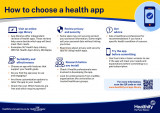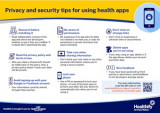You can now add Healthify as a preferred source on Google. Click here to see us when you search Google.
Dementia apps
Apps to support people living with dementia and their carers
Dementia apps
- There are a variety of apps to support people living with cognitive impairment or dementia and their carers.
- Apps can help with routine and medication reminders, improve interaction and communication or support carers.
- Find out more about dementia apps.

Dementia is an overall term to describe a collection of symptoms, such as loss of memory, language, problem-solving and other thinking abilities, that are severe enough to interfere with daily life. It affects behaviour, feelings and relationships. Learn more about dementia.
There are a variety of apps to support people living with cognitive impairment or dementia and their families.
- Routine and medication reminders apps include features for reminding individuals and their caregivers about medications, appointments, or other important daily tasks.
- Reminiscence therapy or memory trigger apps help individuals with dementia reminisce and recall memories about their past. Showing photos, music, or videos that are personalised to their history, can evoke positive memories and aid in communication.
- Carer support apps aim to assist carers in managing the care process, offering tips, reminders, and tracking features for medication, appointments, or behaviour monitoring. They may also offer emotional support, education, and a community for carers. Read more about Carer support apps.
- Cognitive stimulation apps are designed to engage users with mental exercises that stimulate problem-solving and other cognitive skills.
Before choosing an app, think about how it will benefit you and what you want it to be able to do.
- An app will only be helpful if you use it, so it needs to be something you like using and find easy to use.
- If you find the app difficult to use, or you don't like the imagery or look of it, or the language it uses, you may want to find another one that suits you better.
- Check how your data is collected, stored and used in the app, including whether it’s shared with or sold to third parties.
- For more guidance on how to choose health apps, see How to choose a health app.
- It's important to remember that apps don’t replace professional help or your doctor’s advice.
| App name | Description | Review |
|
|
A virtual reality app designed to help you get a fully immersive insight into the varied symptoms people with dementia can experience. Read more about A Walk Through Dementia |
|
|
|
An app for visitors, friends or whānau of people with dementia, to encourage interactions on their visits to residential care. Read more about A Better Visit |
|
|
|
An app for those interested in healthy ageing, or people who may have health or lifestyle factors that place them at risk of dementia. Read more about BrainTrack. |
|
|
Elli Cares: Dementia support app
|
An app for people living with early to mid-stage cognitive impairment. Read more about Elli Cares: Dementia support app |
|
|
RecoverBrain Language Therapy app
|
An app for people who have problems with memory, communication and thinking, such as those recovering from stroke or who have aphasia, dementia, Alzheimer's disease, or traumatic brain injury (TBI). Read more about RecoverBrain Language Therapy app |
|
|
|
An app to encourage interaction and conversation with people with mild-to-moderate dementia. Read more about Thinkability |
References
- Brown A, O'Connor S. Mobile health applications for people with dementia – a systematic review and synthesis of qualitative studies(external link) Inform Health Soc Care. 2020;45(4):343-359
|
Disclaimer: The NZ Health App Library is a free consumer service to help you decide whether a health app would be suitable for you. Our review process is independent. We have no relationship with the app developers or companies and no responsibility for the service they provide. This means that if you have an issue with one of the apps we have reviewed, you will need to contact the app developer or company directly. |
Factsheets – using health apps safely

How to choose a health app
Healthify He Puna Waiora, NZ

Privacy and security tips for using health apps
Healthify He Puna Waiora, NZ
Credits: Healthify editorial team. Healthify is brought to you by Health Navigator Charitable Trust.





